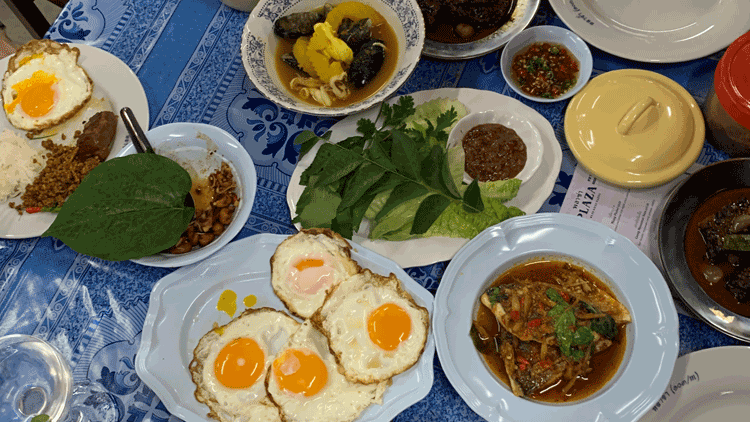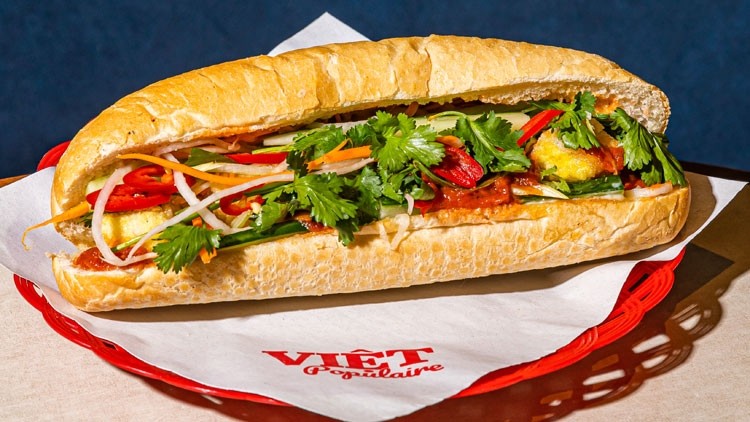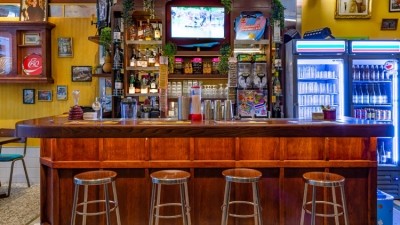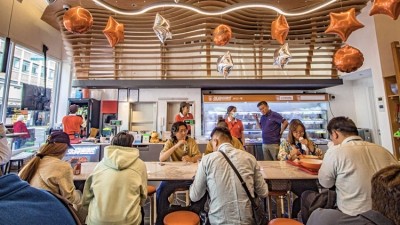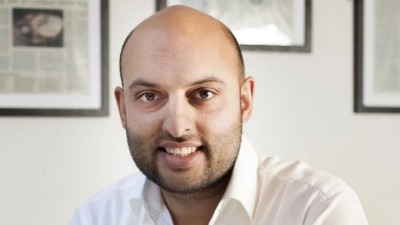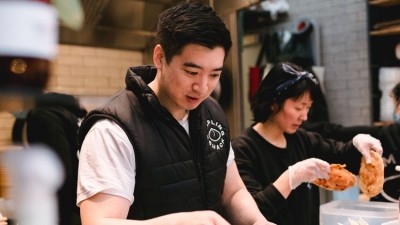Friends in Thai places: the chef championing less established Thai cuisine
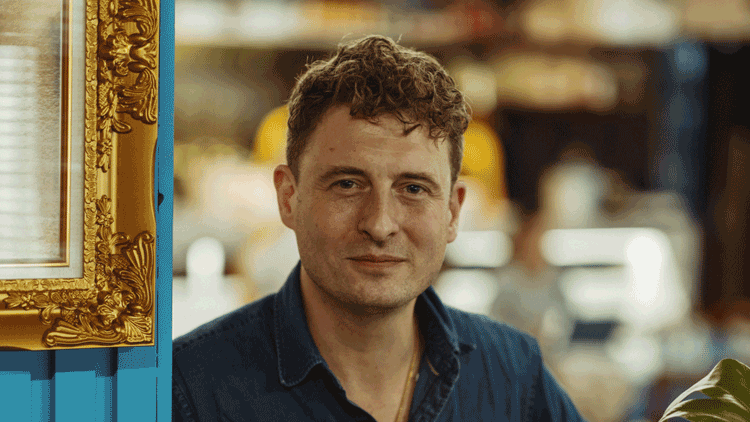
Luke Farrell is examining a sealed bag of rather pungent fish when I catch up with him at Plaza Khao Gaeng, the southern Thai restaurant that sits above Arcade. It’s a few days after the JKS-operated food hall hosted the after party for The World’s 50 Best Restaurants ceremony, where the team from 11 Madison Park among other culinary luminaries dined on fiery food in the brightly lit Thai restaurant, and the chef is back to what he does best - introducing Londoners to Thai flavours and sensations not typically found beyond southeast Asia.
The fish in question turns out to be salted catfish and was spirited into this country in a suitcase that had fortunately slipped the gaze of any customs officials (it is so pungent that after a while he moves it away to the kitchen). While Farrell is by no means the first chef to use such ‘creative’ measures to get hard-to-get ingredients required for cooking - BigHospitality has previously heard stories of live king crabs entering the country in a similar fashion - he has form in this area. In fact, his very livelihood is built on the growing and cooking of Thai ingredients that originally found their way into this country not necessarily via the proper channels.
Farrell’s journey to opening a Thai restaurant just off Tottenham Court Road, and with a second about to launch in Chinatown in the coming months (more on that later), began in Thailand by way of Dorset more than a decade ago. Having fallen in love with the country and its food while visiting, the former Salt Yard chef was inspired to bring back some plant seeds and cuttings to the UK to see how they might fare. Making use of his father’s butterfly farm and its available greenhouses, he successfully managed to grow a range of Thai herbs and ingredients at a time when it was proving difficult for chefs to source ingredients for their Thai restaurants because of Thai preservation methods that were frowned on by the EU.
One such chef was David Thompson, then at Nahm at The Halkin in Belgravia, who was so impressed with Farrell’s horticultural skills that on a return trip to Thailand he hooked him up with his head chef Adam Lee Cliff. The pair embarked on a tour of Bangkok’s Chatuchak Plant Market where Farrell was introduced to even more of Thailand’s bounty. “Let’s just say that some of those plants made their way back to the UK,” says Farrell with a sheepish grin.
A growing business
From acorns oak trees grow, and from cuttings of Thai plants thus has Farrell’s business sprouted. Today the chef grows all manner of Thai ingredients at Ryewater Nursery in Dorset that include numerous varieties of chillies and basil as well as banana palms, gourds, and melons that would otherwise be hard to come by on these shores. And it is with these ingredients, as well as judiciously sourcing the best of what he can’t grow or make from Thailand, that he has created a restaurant that has set Londoners’ taste buds - and mouths - alight with punchy, fiery dishes.
Setting up a farm to grow plants native to lands 6,000 miles away in order to support a restaurant venture might sound extreme but, says Farrell, it was one of necessity. Indeed, some of the early success of London Thai restaurants Som Saa and Kiln can be traced back to Farrell, whose nursery supplied them in the early days (Farrell is now the sole user of his crop in order to meet demand from Plaza and those restaurants have since begun cultivating their own crops over here).
“The ingredients lose their punch when they come over from Thailand, all of the herbs are refrigerated to within an inch of their lives, so they don’t have that flavour,” he says when asked why he doesn’t import them. “Bringing them up from Dorset where we can really adds something to the menu.”
As important is the fact that Plaza can operate in the same fashion as many other restaurants that either grow their own ingredients or source locally, but not typically Thai ones. Many dishes are seasonal and the menu going forwards will be dictated by what Farrell is able to get his hands on in Dorset.
“Right now, there is a glut of chillies and herbs coming through - it’s about getting all of that stuff on the menu,” says Farrell. “The menu will change at Plaza to offer more specialist dishes using those ingredients at the forefront rather than imported pastes from Thailand (Farrell does import very high quality curry pastes from Thailand when he needs to). There will be lot more specials and sharing plates.”
At the nursery Farrell currently grows five different types of basil, including clove basil, which he says is used in Thailand to balance out the strong favours of game and river fish and can also be stir fried in replace of Holy basil to make the famed chicken and basil stir-fry pad kra pao. Three of the basil types he is using at Plaza, the other two of which will go into dishes at the Chinatown restaurant. Chillies will be used fresh but also dried for use in soups and pastes, with some picked when they are unripe to add a different flavour element.
“The idea is we have a much more open menu, this is what we’ve got so this is what we’re going to use,” he adds. “Thai food is seasonal, there is a season for sator beans in Thailand (often called stink beans because of the strong aroma and which are stir fried with tiger prawns and a curry paste at Plaza) just as there is a season for asparagus over here.”
Playing with fire
As noticeable as Plaza’s roster of lesser-known ingredients that also includes snake fruit, betel leaves, garcinia, and long pepper is the heat element of many of its dishes, leading to it being referred to by a number of publications as the ‘hottest’ new restaurant. There is no denying that many of the dishes at Plaza have a high heat rating, not least his kua kling muu dish of dry wok-fried pork, southern curry paste, chillies and long pepper. Is there a danger that the food might simply be too hot for some people?
If there is, he doesn’t seem to mind. While he acknowledges the heat of some - but not all - of his dishes he says there is a way of eating at Plaza without blowing your head off, although diners who don’t like highly spiced dishes will likely still suffer.
“That is the southern way, they like it really hot,” he says unapologetically. The restaurant’s name translates as somewhere that serves curry over rice, and Farrell describes many of his dishes as “rice pullers”. “If something is hot you eat a lot of rice with it. In the south of Thailand it is very tropical and they are fantastic at growing chillies. The food is of the place.
“But there is a way through the menu - the muu hong (braised pork belly with spices) and massaman curry are not hot, people should aim for balance. The vegetable dishes can also help to extinguish the fire. But I think you need something very very hot to wake everything up. It’s not just a searing chilli heat, there’s heat from the black pepper and long pepper and a certain type of heat from the turmeric. There’s no getting away from it, there’s an onslaught of heat, even without the chilli.”
Does he warn people who might not have genned up on the restaurant first? “We don’t want to talk about it too much because then they get spooked, but we ask if they like spicy food. If they say no, then we recommend certain dishes. If they say yes, then all good.”
The need for speed
If Plaza has blazed a trail in bringing new, punchy flavours to western palates then Farrell’s next venture, also in partnership with JKS Restaurants, will keep up the momentum. Named Speedboat Bar, the restaurant promises ‘an overload of the senses’ and is described by the chef as a love letter to Yaowarat Road, the neon-lit street of Bangkok’s Chinatown.
Taking its name from the traditional long-tailed boats of Thailand that have been fitted with supercharged engines (a fitting metaphor for his cooking) Farrell appears more at home with his central Thailand focused project. While the strip-lit and stripped-back aesthetic of Plaza is designed to reference the no-frills Thai curry restaurants with its vinyl table covers, cheap cutlery and chipped crockery (his words, not mine) with Speedboat Bar there is more of Farrell’s own personality on show.
"There’s no getting away from it,
there’s an onslaught of heat, even
without the chilli”
Once again, the feel is utilitarian with stainless steel tables and chairs and wall-mounted fans a homage to a Thai-Chinese shophouse but here Farrell seems even more confident of its raison d’etre splitting, as he does, his time between London, Dorset and Bangkok. “I was on a journey myself with Plaza and my knowledge is increasing,” he says. Speedboat Bar, by contrast, is inspired by his intimate knowledge of the food of Bangkok’s Chinatown and also of his speedboat racer friends.
As with Plaza, the menu reads like nothing that has been seen in the capital before. Just like on Yaowarat Road, the majority of the dishes served at Speedboat Bar will be Chinese in origin but tweaked to suit Thai palates. The menu will include drunken noodle dishes, stir fries, braised meats, salads and soup alongside more complex curries, such as lychees and roasted duck; and soya chicken and winter melon.
Dishes will be milder than at Plaza, with dried chillies used more in dressings. A clam dish will be accompanied by three different dipping sauces, hot, peanut and tamarind, in reference to a place in Bangkok that he says serves a dish with three sauces “a sour one for single people, a hot one for couples, and a sweet and spicy one for families”.
At Speedboat Bar he also promises ingredients not typically associated with Thai food, such as beef tendon, tongue and brisket used in either a green or red curry. “It’s something yielding and soft and nice on rice without the searing heat of southern Thai food. We wanted to explore this Yaowarat Road style. There they make a curry that uses a whole snake fish belly. The textures in Thai and particularly Chinese food are really important; things like sea cucumbers and abalone are all about textures. The gelatinous pop of a chicken feet is what they go for.”
Farrell is also having more fun decor wise at project number two. Located on the site that was once home to modern Tawainese restaurant XU and more recently the pop-up Viet Populaire, both also operated by JKS, the upstairs bar will have a more clubhouse feel with a pool table and a progressive cocktail list. Chief on the drinks menu will be “the best whiskey sodas in London” made with Jamesons and house-made soda, and a Shop Window Old Fashioned named after the Pecking ducks found hanging in the windows of Chinatown restaurants and made with fat- washed whisky.
And then there’s the speedboats, a respectful nod to Bangkok’s 'Hells Angels of the water'. Three have been specially made in Thailand for the restaurant and will hang from the ceiling. It is these rather than the food that might be the most familiar to those who have travelled to Thailand, he believes. “If you’ve been to Thailand at some point you would have been on a long tail boat, people are familiar with them from traveling. Bangkok used to be called the Venice of the East, it was how the city was connected.”
The JKS partnership
Such frivolity but also close attention to detail couldn’t be possible without the support of JKS Restaurants, which has form in recreating venues from across the world in the capital, whether it be the high society clubs of Indian in Gymkhana or Tehran’s hole in the wall eateries as it has done with Berenjak. In typical Farrell style, when asked how he first became involved with the JKS team he says it was while working with Karam Sethi, one of the JKS triumvirate, at Indian restaurant Trishna. “I was trying to pinch his crab recipe,” he says.
Whether he was successful or not is another story, but the pair kept in touch once Farrell left. Last year he was brought in to launch bánh mì pop-up Viet Populaire at JKS' Soho site, that was previously home to its XU teahouse and restaurant during the pandemic, they met to talk about doing a Thai concept at Arcade, for which the Sethis has taken on the operations (Viet Populaire has since take up residence at Arcade Food Hall).
Talks initially centred on creating a satay offer for the main food hall but Farrell later enquired about the space above on the mezzanine floor that was previously home to Tata Eatery’s katsu sando concept Tou and a plan was hatched to do something more substantial.
“The support structure around opening a restaurant is unparalleled,” he says of working with JKS and the Sethis. “I’ve never seen a team that gets things done so well. Karam is a big Thai food fan and he’s got a good idea of what works in these spaces. When I was looking at transferring some of my ideas from Thailand to London it soon became clear that not everything would work.”
Despite the highly stylised nature of the JKS aesthetic, Farrell believes that both at Plaza and Speedboat Bar it is the food that will really do the talking. “The way we’ve styled it, there’s nowhere to hide. The food has to be right. Yes, it’s fun to have some boats on the ceiling but the excitement of it should be on the table - there is very little compromise on the food with any of this otherwise it really does look like something that is all style and no substance.
“I want to create a simple and vernacular Thai cuisine of things I eat a lot of in Thailand and which I miss the most. For me, if the food isn’t as it is in Thailand then it doesn’t work; the illusion disintegrates.”
To be true to Thailand requires Thai chefs, but not all of the kitchen at either restaurant will be Thailand due to the challenges this represents. At Plaza the head chef is Thai as is one other chef, the rest of the small brigade are from elsewhere, which Farrell is content with.
“You need a mixture of backgrounds - a Thai person with a fantastically trained palate but also someone with good operational knowledge of restaurants in the UK. It’s a hell of a lot easier if you have a Thai chef who knows what they are doing but there is a high level of understanding of how to cook Thai food required of all of our chefs.”
With Speedboat Bar, an intimate knowledge of wok cooking is also required whether the chef has Thai background or not.
Farrell himself will split his time between London, Dorset and Thailand meaning that he won’t be an ever presence in either Plaza or Speedboat’s kitchens. To address this, Jane Alty, owner and head chef at the excellent Thai restaurant The Begging Bowl in Peckham has been brought on as executive chef, overseeing the food offer at both the restaurants as well as any future projects.
"There is very little compromise on the food with
any of this otherwise it really does look like something
that is all style and no substance"
What of the fact that Farrell himself is not from Thailand? With cultural appropriation around food a hot topic in recent years, how does he feel as a white person cooking the food of a land of which he is not native?
“I believe that much like anyone can become a medical doctor or something like, that they don’t have to be from a certain country or background,” he replies. “Food is the same and I’ve specialised in this, and this is my experience of it. I’m not pretending I was born in Thailand or that I grew up there. I’ve got an aunt whose French but who can’t cook to save her life. Should I ask her to cook a souffle?”
Blue sky thinking for greenhouses
There’s no denying Farrell’s dedication to his craft. While few will have had the type of access to greenhouses, he has in order to pursue his dream the way in which he has created a small slice of Thailand in Dorset is nothing short of incredible. Nor is his almost encyclopaedic knowledge of the herbs and vegetables he grows, of their flavour profile, culinary use and where they grow. Farrell has what he calls a ‘living library’ of more than 100 plants that are growing in greenhouses, so of which could eventually be grown on a larger scale if needed.
And needed they might be. With JKS’ backing Farrell hopes in the future to open yet another restaurant, this time celebrating the food of northern Thailand, and to do so his nursery has to expand with him. Plans are under way for a new greenhouse, 35 metres in length and 9 metres high to support Plaza and Speedboat Bar and any subsequent new opening.
Again, true to form, it won’t just be any ordinary greenhouse though. Farrell’s idea is to make it look as if it were located on the banks of the Mekong River with a waterway running down one side of the greenhouse full of catfish, water chestnuts and morning glory. The remainder will act as if sections cut out of the jungle to grow runs of herbs, gourds, melons and other ingredients.
The greenhouse will also pay homage to the naga snake, a serpent that features in Hindu and Buddhist mythology and which wards off bad spirits, that will wind its way through the glass building.
“With Plaza and Speedboat and also to represent other regions in Thailand, for that we need a bloody great greenhouse,” he says of his project. “If it’s just a greenhouse and is set up orderly then it’s no fun. But if you’ve got a snaking path with a naga head at the end then it could be really cool.”
The durian fruit will also be present. Though it has been banned on many types of public transport across Thailand, Japan and Hong Kong because of its intensely pungent smell, for obvious reasons the rail services over here haven’t thought to do the same. So, when Farrell took one that he’d brought over from Thailand on a train to Dorset, wrapped judiciously in many layers and kept in a suitcase, he still managed to clear out the entire train carriage. Some things, it seems, never change.
